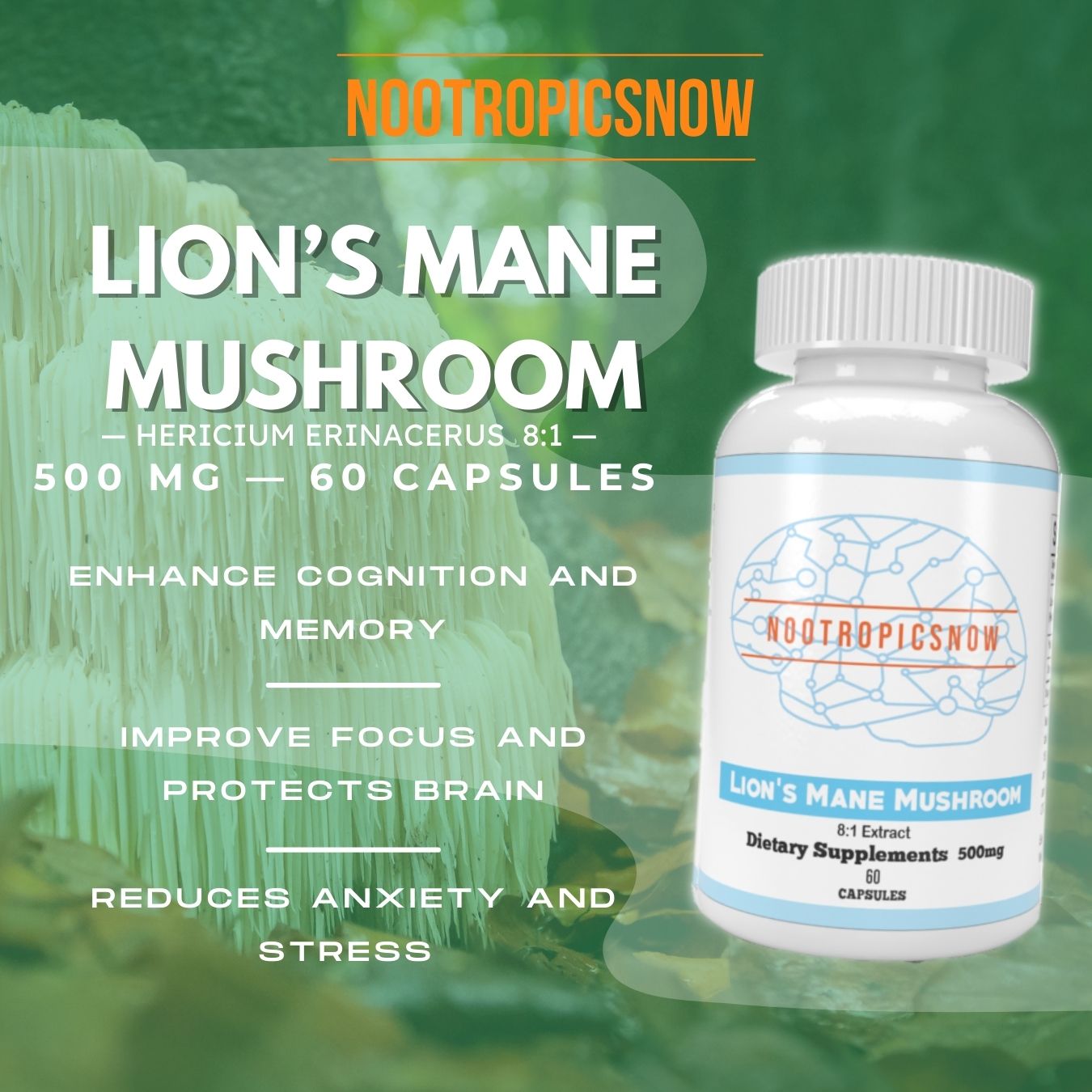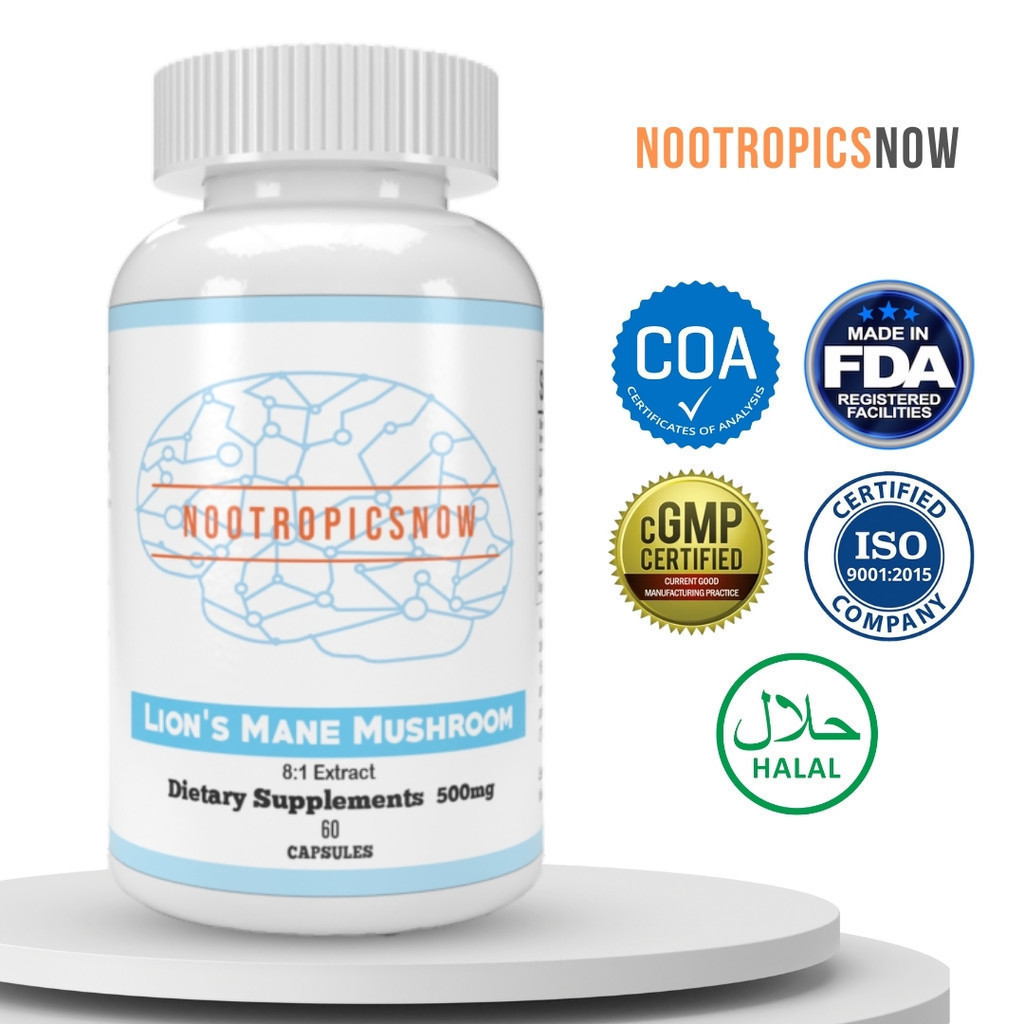Lion’s Mane Supplement: Benefits & Uses

Lion’s Mane Supplement: A Comprehensive Guide
Lion’s mane (Hericium erinaceus) is a unique medicinal mushroom that resembles a lion’s mane as it grows. Used for centuries in traditional Chinese medicine, this fascinating fungus is now celebrated worldwide for its potential cognitive and neurological benefits. As a result, lion’s mane supplements have surged in popularity. This comprehensive guide explores the uses, benefits, dosage, and safety aspects of lion’s mane, helping you decide if it’s right for you.
What is Lion’s Mane?
Hericium erinaceus, commonly known as lion’s mane, is an edible mushroom belonging to the tooth fungus group. It’s identifiable by its cascading spines of white to off-white color. Unlike many mushrooms grown in the ground, lion’s mane thrives on decaying hardwood trees, particularly beech. For centuries, traditional medicine practitioners in East Asia have utilized it for its purported health-promoting properties. Now, with growing scientific interest, researchers are beginning to validate some of these historical uses through modern scientific investigation. Thus, the traditional understanding of lion’s mane may have a solid, scientific basis.
Unveiling the Key Compounds
Lion’s mane contains several bioactive compounds believed to contribute to its health benefits. These substances can be broadly categorized into:
Hericenones: Primarily found in the fruiting body (the visible part of the mushroom), hericenones are known to stimulate nerve growth factor (NGF) production.
Erinacines: Primarily found in the mycelium (the root-like structure) of the mushroom, erinacines can cross the blood-brain barrier more effectively than hericenones, leading to a potentially stronger impact on brain health.
Polysaccharides: These complex carbohydrates, including beta-glucans, are known for their immune-modulating properties.
Antioxidants: Lion’s mane is rich in antioxidants that help protect the body against free radical damage.
Consequently, these compounds work together to create a multi-faceted approach to promoting health.
Benefits Backed by Science: What Lion’s Mane Can Do For You
Scientific research suggests that lion’s mane offers a variety of benefits, mainly centered around cognitive function, neurological health, and immune support.
1. Cognitive Enhancement & Neuroprotection
The most compelling benefit of lion’s mane lies in its potential to boost cognitive function. Studies show that it may:
Improve Memory: Human studies suggest lion’s mane can enhance memory and cognitive function, particularly in older adults with mild cognitive impairment.
Promote Nerve Growth: NGF is crucial for the survival and function of brain cells. Lion’s mane’s hericenones and erinacines stimulate NGF production, which could protect against neurodegenerative diseases.
Reduce Anxiety & Depression: Research indicates that lion’s mane might help reduce symptoms of anxiety and depression, perhaps by promoting brain health and modulating neurotransmitter activity.
Enhance Focus & Clarity: Some users report experiencing improved focus and mental clarity after taking lion’s mane supplements.
2. Neurological Support
Beyond cognitive enhancement, lion’s mane shows promise in supporting overall neurological health:
Nerve Regeneration: Studies suggest lion’s mane can aid in nerve regeneration after injury.
Protection Against Brain Damage: Animal studies suggest that lion’s mane may protect against brain damage caused by stroke. However, more research is needed in humans.
3. Immune System Modulation
Lion’s mane contains polysaccharides that can enhance the immune system, which may:
Boost Immunity: Beta-glucans in lion’s mane stimulate immune cell activity.
Reduce Inflammation: Lion’s mane exhibits anti-inflammatory properties, potentially reducing the risk of chronic diseases.
4. Digestive Health
Emerging research suggests that lion’s mane can support gut health:
Protect Against Ulcers: Lion’s mane may protect against the development of stomach ulcers by inhibiting the growth of H. pylori.
Reduce Inflammation: It might reduce inflammation in the gut, benefiting conditions like inflammatory bowel disease (IBD).
5. Other Potential Benefits
While research is ongoing, lion’s mane shows promise in other areas, including:
Blood Sugar Control: Some studies indicate that it may help regulate blood sugar levels.
Wound Healing: It may accelerate wound healing.
Caveats: It’s important to note that many of these studies are preliminary, and more human research is needed to confirm these benefits conclusively.
Navigating the World of Lion’s Mane Supplements
Choosing the right lion’s mane supplement can be overwhelming. Here’s what to consider:
Extract vs. Whole Mushroom Powder:
Extracts: Typically, extracts are more potent as they concentrate the beneficial compounds like hericenones and erinacines. Look for dual extracts, meaning both water and alcohol were used to extract the beneficial compounds.
Whole Mushroom Powder: Contains the entire mushroom, providing a broader range of nutrients but potentially lower concentrations of specific bioactive compounds.
Fruiting Body vs. Mycelium:
Fruiting Body: This is the mature mushroom and is typically considered to have a higher concentration of beneficial compounds.
Mycelium: This is the root-like structure of the mushroom. Some companies grow mycelium on grains like rice, resulting in a product that may contain a significant amount of starch.
Third-Party Testing: Look for supplements that have been tested by a third-party laboratory to ensure purity, potency, and absence of contaminants like heavy metals.
Organic Certification: Opt for organic supplements to minimize exposure to pesticides and other harmful chemicals.
Here is a Lion’s Mane Mushroom supplement you might be interested in:

View Product
Alternatively, you can also consider this Lion’s Mane supplement:

View Product
Dosage: Pay attention to the recommended dosage on the product label and consult with a healthcare professional to determine the appropriate dosage for your individual needs.
Dosage Guidelines: Finding Your Sweet Spot
The optimal dosage of lion’s mane varies depending on the individual and the specific product. However, general guidelines suggest starting with a low dose and gradually increasing it as needed. A common starting dose is around 300-500mg per day, with some people taking up to 3000mg per day. It’s advisable to divide the daily dose into smaller amounts taken throughout the day.
Important Considerations:
Start Low, Go Slow: Begin with a lower dose and gradually increase it over several weeks to assess your tolerance and observe any potential side effects.
Consistency is Key: For optimal results, take lion’s mane supplements consistently over a period of weeks or months.
Listen to Your Body: Pay attention to how your body responds to lion’s mane and adjust the dosage accordingly.
Consult a Healthcare Professional: If you have any underlying health conditions or are taking other medications, consult with a healthcare professional before taking lion’s mane supplements.
Safety & Potential Side Effects: What to Watch Out For
Lion’s mane is generally considered safe for most people. However, some individuals may experience mild side effects such as:
Digestive Upset: Some people may experience mild digestive issues such as nausea, bloating, or diarrhea.
Allergic Reactions: Although rare, allergic reactions to lion’s mane are possible.
Drug Interactions: Lion’s mane may interact with certain medications, such as blood thinners and anti-diabetic drugs.
Precautions:
Pregnancy & Breastfeeding: There is limited information about the safety of lion’s mane during pregnancy and breastfeeding. Therefore, it is best to avoid using it during these times.
Surgery: It’s recommended to discontinue lion’s mane supplements at least two weeks before any scheduled surgery due to its potential effects on blood clotting.
Integrating Lion’s Mane into Your Daily Routine
Lion’s mane supplements can be easily integrated into your daily routine:
Capsules: Take the recommended dosage with water or food.
Powder: Add the powder to smoothies, coffee, tea, or other beverages. You can also mix it into soups, sauces, or baked goods.
Culinary Use: Fresh or dried lion’s mane can be cooked and added to various dishes.
The Future of Lion’s Mane Research
Research into lion’s mane mushroom and its potential benefits is ongoing. Future studies will likely focus on:
Specific Mechanisms of Action: Gaining a deeper understanding of how lion’s mane affects brain function and other physiological processes.
Clinical Trials: Conducting more large-scale clinical trials to confirm the benefits observed in smaller studies.
Therapeutic Applications: Exploring the potential of lion’s mane as a treatment for various conditions, including Alzheimer’s disease, depression, and nerve damage.
Conclusion: Is Lion’s Mane Right for You?
Lion’s mane supplement is a promising natural remedy with a range of potential health benefits, particularly for cognitive function and neurological health. However, it is important to approach these supplements with a balanced perspective, considering the limitations of current research and the potential for side effects. By doing your research, choosing a high-quality supplement, and consulting with a healthcare professional, you can make an informed decision about whether lion’s mane is right for you. While not a magic bullet, lion’s mane could be a valuable addition to a holistic approach to health and well-being.
Maximizing the Benefits of Lion’s Mane Supplement: A Detailed Exploration
Lion’s Mane (Hericium erinaceus) is more than just a culinary curiosity. This fascinating fungus has captured the attention of researchers and wellness enthusiasts alike. It is primarily due to its purported nootropic and neuroprotective properties. This section provides an in-depth look at how to maximize the benefits you can get from a Lion’s Mane supplement. We will cover everything from optimal dosages and timing to synergistic combinations and lifestyle adjustments.
Optimizing Dosage and Timing
Determining the right dosage of Lion’s Mane requires careful consideration. Factors include individual body weight, sensitivity, and desired effects. Furthermore, supplement formulation plays a critical role. A general recommendation suggests starting with a low dose and gradually increasing it. This allows you to assess your tolerance and observe any potential side effects.
Recommended Dosage Guidelines
While scientific consensus on the optimal dosage is still evolving, research and anecdotal evidence suggest these guidelines:
For General Cognitive Support: 500-1000mg per day, taken in one or two divided doses.
For Enhanced Cognitive Function or Mild Cognitive Impairment: 1000-3000mg per day, divided into two or three doses.
For Nerve Regeneration or Neuropathy: Higher dosages, up to 5000mg per day, may be considered under medical supervision.
It’s vital to emphasize that these are general guidelines, and individual responses can vary significantly. Therefore, closely monitoring your body’s reaction is crucial to find the dosage that works best for you.
Timing Considerations: When to Take Lion’s Mane
The timing of your Lion’s Mane supplement intake can also affect its efficacy. Some individuals find taking it in the morning beneficial for enhancing focus and alertness throughout the day. Conversely, others prefer taking it in the evening, noting improvements in sleep quality and relaxation.
Morning Doses: These are ideal for individuals seeking enhanced cognitive function during work or study.
Evening Doses: These might be more suitable for those aiming to improve sleep quality or promote nerve regeneration during rest.
Experimentation is key. Try taking Lion’s Mane at different times of the day to determine what works best for your body and schedule.
Choosing the Right Form of Lion’s Mane Supplement
Lion’s Mane supplements are available in various forms, each with its unique characteristics and absorption rates. Selecting the right form can significantly impact the supplement’s effectiveness.
Types of Lion’s Mane Supplements:
Capsules: Capsules are one of the most common forms, offering a convenient and pre-dosed option. Look for capsules containing both the fruiting body and mycelium for a more comprehensive range of compounds.
!Product Image
View Product
!Product Image
View Product
!Product Image
View Product
!Product Image
View Product-Nootropic-Memory-Booster-Supplement-Focus-i.202321183.3851668485)
Powders: Powders provide flexibility in dosage and can be easily mixed into beverages or food. Ensure the powder is derived from high-quality sources and is free from fillers or additives.
Extracts: Liquid extracts offer rapid absorption and can be a good option for those who have difficulty swallowing pills. Pay attention to the extraction method, as some methods preserve more beneficial compounds than others.
Tinctures: Tinctures are alcohol-based extracts that offer a concentrated dose of Lion’s Mane. However, the alcohol content may not be suitable for everyone.
Fruiting Body vs. Mycelium: What’s the Difference?
A common debate surrounds the use of fruiting body versus mycelium in Lion’s Mane supplements. The fruiting body is the mature, mushroom-shaped part of the fungus, while the mycelium is the root-like structure. Both contain beneficial compounds, but their composition differs.
Fruiting Body: It is typically richer in beta-glucans, known for their immune-modulating properties.
Mycelium: It contains higher concentrations of nerve growth factor (NGF) stimulating compounds, such as hericenones and erinacines.
Some experts recommend choosing supplements that contain both fruiting body and mycelium for a well-rounded range of health benefits. It’s because they synergistically enhance cognitive and immune functions.
Enhancing Absorption and Bioavailability
Bioavailability refers to the extent to which a substance is absorbed into the bloodstream and becomes available to the body. Enhancing the bioavailability of Lion’s Mane can maximize its benefits.
Strategies to Improve Absorption:
Take with Food: Consuming Lion’s Mane with a meal, especially one containing healthy fats, can improve absorption. Fats can aid in the transport of fat-soluble compounds present in the mushroom.
Combine with Black Pepper Extract (Piperine): Piperine, found in black pepper, has been shown to enhance the bioavailability of various compounds.
Liposomal Formulations: Liposomal technology encapsulates the supplement in tiny fat-like particles, protecting it from degradation in the digestive system and enhancing absorption.
Synergistic Combinations: Stacking Lion’s Mane with Other Nootropics
Combining Lion’s Mane with other nootropics and supplements can create synergistic effects, leading to enhanced cognitive and neurological benefits. This practice is known as “stacking.”
Popular Nootropic Stacks with Lion’s Mane:
Lion’s Mane + Bacopa Monnieri: This combination may enhance memory and cognitive function. Bacopa is renowned for its ability to improve memory and reduce anxiety, while Lion’s Mane supports nerve growth and overall brain health.
!Product Image
View Product
!Product Image
View Product
!Product Image
View Product
Lion’s Mane + L-Theanine: This stack can promote relaxation and focus, reducing anxiety and improving cognitive performance. L-Theanine, commonly found in green tea, helps modulate the stimulating effects of Lion’s Mane, creating a balanced and calm mental state.
!Product Image
View Product
!Product Image
View Product
!Product Image
View Product-Nootropic-Brain-Support-Booster-Memory-Sleep-Supplement-i.202321183.5451568422)
Lion’s Mane + Creatine: This combination supports both cognitive and physical performance, potentially enhancing energy levels and mental clarity.
Lion’s Mane + Psilocybin (Microdosing): Some users report amplified neurogenesis and enhanced mood with a carefully managed microdosing protocol. Caution: This combination requires careful consideration and adherence to legal regulations, as well as in-depth understanding and potential risks.
Lion’s Mane + Cordyceps: Combining these two potent medicinal mushrooms may offer a synergistic boost to both cognitive and physical energy levels. Cordyceps is known for its adaptogenic properties and ability to enhance oxygen utilization, which can complement Lion’s Mane’s cognitive benefits.
!Product Image
View Product
!Product Image
View Product
!Product Image
View Product-Energy-Brain-Booster-Stress-Supplement-i.202321183.8251152636)
When stacking nootropics, start with low doses of each substance and gradually increase them while monitoring for any adverse effects. Consulting with a healthcare professional is highly recommended before initiating any new supplement regimen.
Lifestyle Factors: Complementing Lion’s Mane with Diet, Exercise, and Sleep
While Lion’s Mane supplements can offer cognitive and neurological benefits, their effectiveness is enhanced when combined with healthy lifestyle habits.
The Importance of a Balanced Diet:
A diet rich in antioxidants, healthy fats, and essential nutrients provides the building blocks for optimal brain function. Including foods such as:
Fatty fish (salmon, mackerel): Rich in omega-3 fatty acids, essential for brain health.
Berries: High in antioxidants, which protect brain cells from damage.
Leafy greens: Good sources of vitamins and minerals that support cognitive function.
Nuts and seeds: Provide healthy fats and protein.
The Role of Regular Exercise:
Physical activity increases blood flow to the brain, promoting neurogenesis and cognitive function. Aim for at least 30 minutes of moderate-intensity exercise most days of the week.
Prioritizing Sleep Quality:
Sleep is crucial for brain health and cognitive function. During sleep, the brain consolidates memories, clears out toxins, and repairs itself. Aim for 7-9 hours of quality sleep per night.
Establish a regular sleep schedule.
Create a relaxing bedtime routine.
Ensure your sleep environment is dark, quiet, and cool.
Potential Side Effects and Interactions
While Lion’s Mane is generally considered safe, some individuals may experience side effects. These can include:
Digestive upset: Nausea, diarrhea, or stomach cramps.
Allergic reactions: Skin rashes, itching, or difficulty breathing (rare but serious).
Blood thinning effects: Lion’s Mane may have mild anticoagulant properties, so individuals taking blood-thinning medications should exercise caution and consult with their healthcare provider.
Additionally, Lion’s Mane may interact with certain medications. Individuals taking medications for diabetes, blood pressure, or immune disorders should consult with their healthcare provider before taking Lion’s Mane supplements.
Ensuring Product Quality and Authenticity
The supplement industry is not always well-regulated. This can lead to issues with product quality and authenticity. It is essential to choose high-quality Lion’s Mane supplements from reputable brands.
Tips for Selecting High-Quality Supplements:
Look for Third-Party Testing: Choose supplements that have been tested by an independent laboratory for purity, potency, and contaminants.
Check for Certifications: Look for certifications such as NSF International, USP Verified, or Informed-Sport, which indicate that the product has met certain quality standards.
Read Reviews: Research the brand and read customer reviews to get an idea of the product’s effectiveness and safety.
Check the Label: Ensure that the label clearly lists all ingredients and dosages. Be wary of products that contain proprietary blends or vague ingredient lists.
Buy from Reputable Sources: Purchase supplements from reputable retailers or directly from the manufacturer to ensure authenticity.
Monitoring and Adjusting Your Regimen
Maximizing the benefits of Lion’s Mane supplement is an ongoing process that requires careful monitoring and adjustments.
Key Steps for Monitoring Your Regimen:
Keep a Journal: Track your dosages, timing, and any effects you experience, both positive and negative.
Be Patient: It may take several weeks or months to experience the full benefits of Lion’s Mane.
Adjust as Needed: If you are not experiencing the desired effects, consider adjusting your dosage, timing, or supplement form.
Consult with a Healthcare Professional: If you have any concerns or questions, consult with a healthcare professional who is knowledgeable about nootropics and supplements.
By carefully considering dosage, timing, supplement form, synergistic combinations, lifestyle factors, and product quality, you can maximize the benefits of Lion’s Mane supplement and optimize your cognitive and neurological health. Remember to approach supplementation with caution, listen to your body, and consult with a healthcare professional when needed.



